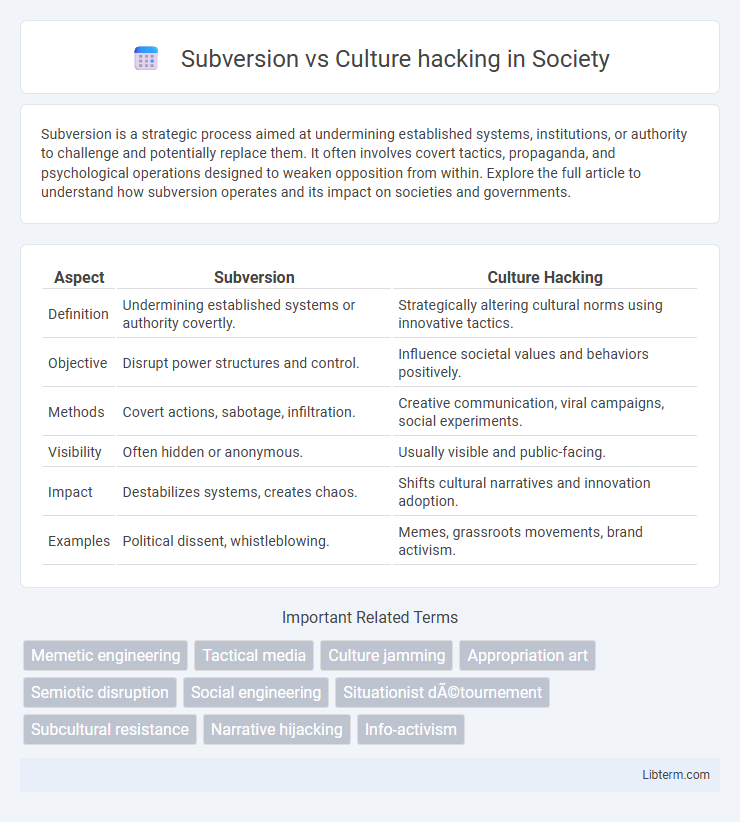Subversion is a strategic process aimed at undermining established systems, institutions, or authority to challenge and potentially replace them. It often involves covert tactics, propaganda, and psychological operations designed to weaken opposition from within. Explore the full article to understand how subversion operates and its impact on societies and governments.
Table of Comparison
| Aspect | Subversion | Culture Hacking |
|---|---|---|
| Definition | Undermining established systems or authority covertly. | Strategically altering cultural norms using innovative tactics. |
| Objective | Disrupt power structures and control. | Influence societal values and behaviors positively. |
| Methods | Covert actions, sabotage, infiltration. | Creative communication, viral campaigns, social experiments. |
| Visibility | Often hidden or anonymous. | Usually visible and public-facing. |
| Impact | Destabilizes systems, creates chaos. | Shifts cultural narratives and innovation adoption. |
| Examples | Political dissent, whistleblowing. | Memes, grassroots movements, brand activism. |
Introduction to Subversion and Culture Hacking
Subversion involves deliberately undermining established systems, norms, or institutions to provoke change, often through covert or disruptive actions that challenge power structures. Culture hacking manipulates cultural codes and symbols to influence social behaviors and perceptions, using creative interventions to reshape public discourse and cultural narratives. Both approaches leverage strategic disruption but differ in methods, with subversion targeting systemic foundations and culture hacking focusing on cultural context and collective mindset.
Defining Subversion: Methods and Motivations
Subversion involves covert actions aimed at undermining established systems, often through stealthy tactics like misinformation, infiltration, or sabotage to disrupt political, social, or organizational structures. Motivations for subversion typically stem from desires to overturn power dynamics, challenge authority, or promote radical change by destabilizing prevailing norms. This strategic undermining contrasts with culture hacking, which modifies cultural norms and behaviors through creative, often transparent interventions designed to shift perceptions and values.
What is Culture Hacking?
Culture hacking involves strategically understanding and influencing organizational or social cultures to drive meaningful change and innovation. It leverages behavioral insights, communication techniques, and empathy to reshape norms, values, and practices within communities or companies. Unlike subversion, which aims to undermine or overthrow existing structures, culture hacking seeks to transform and improve cultures from within.
Historical Roots of Subversion
Subversion traces its roots to political resistance movements and ideological struggles dating back to early 20th-century revolutionary tactics aimed at undermining established power structures from within. Cultural hacking originated later as a form of activist expression combining technology, art, and social commentary to disrupt dominant cultural narratives through media and symbolic acts. Understanding the historical evolution of subversion highlights its transformation from direct political rebellion to more nuanced, culture-oriented interventions in modern activism.
Evolution of Culture Hacking in the Digital Age
Culture hacking has evolved significantly in the digital age, leveraging online platforms and social media to influence and reshape societal norms rapidly. Unlike traditional subversion, which often relied on covert or slow-moving tactics, digital culture hacking employs viral content, memes, and real-time engagement to challenge and transform cultural narratives. This evolution has enabled a more dynamic and widespread impact on public perception and behavior, making culture hacking a powerful tool in modern social movements and brand strategies.
Key Differences: Subversion vs Culture Hacking
Subversion seeks to undermine or overthrow established systems by exposing contradictions, often employing covert tactics to disrupt power structures. Culture hacking manipulates cultural elements and social norms to influence behavior and foster innovation within or outside traditional frameworks. The key difference lies in subversion's confrontational intent to dismantle, while culture hacking emphasizes adaptive transformation and creative engagement.
Social and Political Impacts
Subversion undermines established social and political structures by covertly disrupting power dynamics, often leading to increased instability and resistance movements within societies. Culture hacking manipulates cultural symbols and media to subtly influence public opinion and behavior, reshaping social norms and political discourse through innovative, grassroots strategies. Both tactics impact governance and civil engagement by challenging traditional authority and fostering alternative narratives across political landscapes.
Notable Examples from Past to Present
Subversion tactics like the Civil Rights Movement of the 1960s used grassroots activism and legal challenges to dismantle systemic racism, while culture hacking examples include the 1990s hacker collective Anonymous, which leverages digital interventions to disrupt and influence public discourse. The Occupy Wall Street protests illustrate subversion through mass demonstrations addressing economic inequality, whereas contemporary culture hackers exploit social media algorithms to shift narratives and consumer behavior quickly. Both approaches reflect evolving strategies to challenge power structures, with subversion rooted in overt resistance and culture hacking relying on subtle manipulation of cultural codes.
Ethical Considerations and Controversies
Subversion involves intentionally undermining established systems, often raising ethical concerns about legality and harm to institutions, while culture hacking manipulates social norms to inspire change with a more creative, less confrontational approach. Ethical considerations in subversion center on the potential for disruption and the violation of trust or laws, whereas culture hacking navigates the fine line between influence and manipulation without overt deceit. Controversies arise as both strategies challenge power structures, but culture hacking is generally viewed as more ethically palatable due to its emphasis on innovation and engagement rather than direct opposition.
Future Trends and Ongoing Relevance
Subversion and culture hacking remain pivotal in shaping societal narratives and influencing collective behavior, with future trends emphasizing digital platforms and algorithmic manipulation to amplify impact. The ongoing relevance of these tactics lies in their ability to disrupt established power structures through creative, decentralized methods, making them essential tools for social movements and marketing strategies alike. Advancements in AI and augmented reality are expected to further evolve subversion and culture hacking, enabling more immersive and persuasive interventions.
Subversion Infographic

 libterm.com
libterm.com